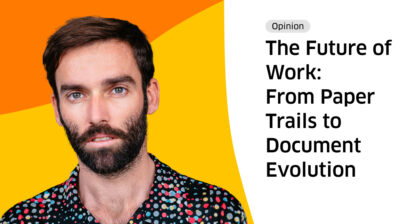Curious about what keeps experts, CEOs and other decision-makers in the Intelligent Document Processing (IDP) space on their toes? Get food for thought on IDP-related topics from the industry’s leading minds.
In this opinion piece, Maxime Vermeir, Senior Director of AI Strategy at intelligent automation company ABBYY, discusses the rapid evolution of AI technologies and the associated ethical issues and privacy concerns.
The ABBYY AI Summit this year was an electrifying gathering of minds, where AI experts Andrew Pery and Alexander Hanff joined me in a spirited fireside chat to dissect the complex world of AI ethics and privacy. Much like the memorable fireside chat between Bobby Axelrod and Mike Prince in the television series Billions, the audience was buzzing with excitement and anticipation. The rapid evolution of AI technologies, while brimming with potential, also brings a Pandora’s box of ethical issues and privacy concerns that demand our immediate attention.
The Human Element in AI
Kicking off the discussion, Andrew highlighted the necessity for a balanced approach to AI deployment. He pointed out the critical issue with Geoffrey Hinton’s prediction about artificial general intelligence (AGI) surpassing human cognition within five years: while this forecast is both thrilling and alarming, it’s tempered by Katie Crawford’s assertion that AI is neither truly artificial nor intelligent, owing to its heavy reliance on natural resources and human labor for data labeling. This underscores the importance of developing purpose-built AI applications that address specific needs rather than chasing the AGI dream, which may still be far off.
Privacy Pitfalls and AI Missteps
Alex shared a personal anecdote that hit home the significance of accurate data in AI systems: when asking ChatGPT for information about himself, the AI model erroneously claimed that he had died. His unsettling experience with ChatGPT declaring him dead illustrated the broader implications of AI inaccuracies, especially in scenarios like job applications or credit assessments. This incident underscores a pressing need for stringent data validation processes and legal frameworks to ensure AI systems handle personal data responsibly.
The Mirage of AI Supervision
Our conversation naturally veered towards the illusion of AI autonomy, as exemplified by Amazon’s AI-driven stores. The revelation that human supervisors in India were manually overseeing these AI decisions shattered the myth of seamless AI operations. This reality check led to a broader discussion about the necessity of human oversight in AI systems. Andrew emphasized that true AI efficacy lies in augmenting human capabilities rather than replacing them outright, a sentiment echoed by recent studies showing AI’s potential to enhance productivity and job quality when integrated thoughtfully into workflows.

Responsible AI: The Path Forward
As we explored the regulatory landscape, it became clear that legislation alone cannot keep pace with technological advancements. Andrew advocated for adopting emerging risk management frameworks and independent audits to ensure AI systems adhere to ethical standards. Alex reinforced this by stressing the importance of transparent data usage policies and the need for organizations to act responsibly beyond mere legal compliance.
Practical Tips for Ethical AI Implementation
To wrap up, both Andrew and Alex offered actionable insights for organizations aiming to navigate the complex terrain of AI ethics and compliance:
- Establish Robust Governance Structures: Implement cross-functional teams dedicated to AI ethics, including algorithmic risk management and data governance committees.
- Operationalize Ethical Principles: Integrate privacy by design and responsible data science practices into your development processes.
- Ensure Human Oversight: Maintain human intervention in AI decision-making processes to uphold accountability and mitigate risks.
- Leverage Purpose-Built AI: Focus on developing AI applications tailored to specific tasks to maximize utility and minimize unintended consequences.
The journey of AI is one of relentless innovation and boundless possibilities. However, as we push the boundaries of what’s possible, it is imperative that we anchor our advancements in ethical considerations and responsible practices. Just like Neo, protagonist of The Matrix, had to choose between the red pill and the blue pill, our AI journey hinges on making the right ethical choices to unlock its true potential without losing our humanity. Only then can we harness the full potential of AI to benefit humanity while safeguarding our fundamental rights and values.

About the Author
Maxime Vermeir is Senior Director of AI Strategy at intelligent automation company ABBYY. With a decade of experience in product and tech, Maxime is passionate about driving higher customer value with emerging technologies across various industries. His expertise from the forefront of artificial intelligence enables powerful business solutions and transformation initiatives through large language models (LLMs) and other advanced applications of AI. Maxime is a trusted advisor and thought leader in his field. His mission is to help customers and partners achieve their digital transformation goals and unlock new opportunities with AI.
📨Get IDP industry news, distilled into 5 minutes or less, once a week. Delivered straight to your inbox ↓







